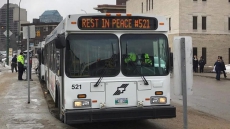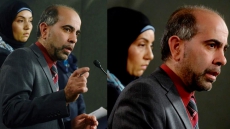VICTORIA — British Columbia's government is staking its re-election on a nearly $1 billion cut in medical service premiums, a small business tax reduction and carefully targeted spending increases on education, health and child welfare in a 2017-18 budget that projects a fifth consecutive surplus.
Finance Minister Mike de Jong said Tuesday the government will move to eliminate unpopular medical service plan premiums, starting with a 50-per-cent cut next year that will see a family earning up to $120,000 annually saving up to $900 in 2018.
Last week, the government announced it was in the financial position to pay back British Columbians after years of penny pinching, and de Jong says it identified the medical premiums as having the greatest impact for families.
"The instrument, mechanism we have chosen is MSP premiums," said de Jong. "We are instituting a dramatic cut in premiums as part of a strategy to ultimately eliminate them."
John Horgan, leader of B.C.'s Opposition New Democrats, said the Liberals mocked the NDP for proposed changes to the plan to ease the burden of constant premium rate hikes.
"They laughed at us and they've doubled it and they are going to reduce it by half next January," he said. "That's a government that over promised and will always under deliver."
Prior to the budget, the right-leaning Canadian Taxpayers' Federation and left-leaning Canadian Centre for Policy Alternatives called on the government to axe the MSP completely, calling it unfair.
"A significant number of British Columbians remain very troubled by the fact we have this charge, this MSP premium, that doesn't exist elsewhere in the country," de Jong said.

The premium brings about $2.5 billion in annual revenues. The cut, effective Jan. 1, 2018, reduces that amount by about $1 billion, de Jong said.
"We're tickled pink," said Jordan Bateman of the B.C. taxpayers' federation. "This is the only tax in B.C. that kept going up year after year, 40 per cent over six years."
Economist Iglika Ivanova of the centre for policy alternatives said she's concerned the government gave up almost $1 billion in revenues by cutting the premium. The government could have explored tax increases for corporations and high-income earners to recover the revenue, she said.
De Jong did not side step the importance the budget will play in the May 9 election. The Liberals have been in power since 2001.
"In a few short months, British Columbians will convene an electoral shareholders' meeting to consider not just the merits of this budget, but the progress we have made as a province," he said in his speech to the legislature.
Horgan said the budget is the government's attempt to make voters forget about 16 years of fee and rate hikes and education and social welfare budget cuts.
The 2017-18 budget also cuts the small business income tax rate to two per cent from 2.5 per cent and eliminates the provincial sales tax on electricity for business by 2019-20.

The $50.2-billion budget forecasts a surplus of $295 million, down from the $1.5-billion surplus forecast for the current fiscal year ending March 31.
The budget includes spending increases in areas where the government has weathered political controversy: education, housing and child welfare.
De Jong said the Children and Family Development Ministry will receive a budget boost of $287 million over three years to support children, youth and their families. He said $120 million will go toward child welfare issues for indigenous children.
Grand Chief Ed John recently called for more supports for indigenous families in a report to the government. The suicide of a Metis teen who spent his last days alone in a hotel while in government care also prompted calls for child welfare reforms.
"This is a start," said Bernard Richard, B.C.'s representative for children and youth. "There are very many vulnerable children out there who require help immediately."
The $287 million is part of $796 million in programs for families and children in need, de Jong said.
He said the budget also moves to address last year's Supreme Court of Canada ruling that requires the government to address shortages in teachers and classroom assistants.

The budget includes $320 million over three years to work towards a final agreement with the B.C. Teachers' Federation on class size and the number of children with special needs in classrooms. The teachers' union has said it could cost up to $300 million annually to address the court decision.
The total increase in the education budget is $740 million.
De Jong said the budget raises the threshold from $475,000 to $500,000 on a program to help first-time homebuyers with the property transfer tax. The increased threshold saves first-time buyers up to $8,000.
He said the Ministry of Health will get a budget increase of $4.2 billion over three years, which includes $100 million to fund youth mental health and substance abuse issues.
De Jong said B.C. is leading Canada in job creation and is expected to challenge Ontario, Alberta and Manitoba for the top performing provincial economy. The government is forecasting economic growth to hit 2.1 per cent in 2017.
While many Canadian governments fight deficits, B.C. is posting surpluses.
"Our balance sheet is the envy of the nation," de Jong said. "Our economic performance is the envy of the nation."
A LOOK AT SOME KEY ELEMENTS OF THE 2017-18 BUDGET

FINANCES:
Government departments will get almost $3 billion more in their operating budgets over the next three years.
Total government expenses are forecast to rise from $50.2 billion in 2017-18 to $51.6 billion in 2019-20.
The surplus is projected to steadily decline over the next three years, from $295 million in 2017-18 to $223 million in 2019-20.
Those are more modest surplus forecasts compared with the projected surplus of $1.5 billion in the fiscal year that ends on March 31.
"Our balance sheet is the envy of the nation," said de Jong.
If the government hits its targets, the 2017-18 budget will be the fifth straight to record a surplus.
He has set aside a contingency fund of $400 million in the next fiscal year to cover unexpected costs.
The government estimates the total provincial debt will stand at about $69.8 billion in 2017-18, up from a forecasted $66.7 billion in 2016-17.
ECONOMIC FORECAST:
A variety of private sector forecasts put B.C. economic growth rate at 2.1 per cent in 2017, among the country's top performers.
The Ministry of Finance says B.C.'s economy grew by three per cent in 2016.
But de Jong is also sounding a note of caution in his budget speech, warning that uncertainty about trade with the United States and declining world demand for resources could threaten the province's economic success.
"World markets are still in flux, resource prices have not yet recovered, and political changes in our neighbours to the south have us cautious about making too many assumptions about the future," he says in the speech.
De Jong says he has taken a conservative approach to the economic forecasts that is basing the budget on growth rates pegged slightly below projections from the Economic Forecast Council.
"This prudence acknowledges the downside risks to B.C. economic outlook, which include the potential slowdown in North American economic activity, uncertainty associated with U.S. fiscal and trade policy, ongoing fragility in Europe, and slower than anticipated Asian demand, particularly in China."
TAX CUTS:
Tax and fee cuts aimed at families and small businesses are sprinkled throughout the budget.
For most people, the headline change is a promise to eliminate medical service premiums, starting next year with a 50-per-cent cut in the fees affecting two million British Columbians.
Families that pay the full premium will save up to $900 in 2018, and individuals will save up to $450.
Individuals with net income up to $26,000 and couples with two children and family net income up to $35,000 will be exempt from the premiums after the government raises income thresholds next year.
The government estimates it will collect more than $2.5 billion in medical service premiums in 2016-17.
A number of groups have been pressing the government to eliminate the premiums.
"We are taking this first significant step, not by raising taxes elsewhere, but by drawing upon the benefits of having Canada's strongest economy."
There is no timetable to eliminate the premiums, with de Jong says that decision will be made based on the province's fiscal position down the road.
First-time homebuyers are also getting a break. The threshold for a program to help first-time buyers is being raised to $500,000, meaning a break of up to $8,000 in the property transfer tax.
Small businesses will have a corporate income tax rate cut to two per cent from 2.5 per cent starting on April 1, saving them $68 million in 2017-18.
Business will also get some relief on their hydro bills with the gradual elimination of provincial sales tax on electricity. By the time the tax is eliminated on April 1, 2019, the government says small- and medium-sized businesses will save $50 million a year.
HEALTH:
Spending on health care will increase by $4.2 billion over the next three years.
De Jong says the government will spend 41 per cent of this year's budget on health care, with spending in 2017-18 pegged at $18.8 billion.
"We spend a lot on health care, and we should," he said in his budget speech. "We have a growing population, and demographic shifts that also mean we have an aging population."
The 2017-18 budget includes an additional $165 million for youth mental health, which includes more funding for counselling and treatment services offered by the Ministry of Children and Family Development, 28 specialized addiction treatment beds for youth provided by the Health Ministry, and startup costs for the B.C. Centre on Substance Use.
The additional funding will also be used to reduce waiting times for addiction treatment services offered by provincial health authorities, and to acquire and renovate buildings to house vulnerable people with mental-health and substance-use issues.
De Jong says the budget does not reflect the $1.4-billion deal the province signed last week with the federal government to improve home care and mental-health programs over the next 10 years.
EDUCATION:
The province's school system will get an additional $740 million over the next three years, with a large chunk of that money earmarked to cover the costs of hiring new teachers after the province lost a Supreme Court of Canada decision on class size.
The 2017-18 budget allocates $5.9 billion for education.
The increased spending over the course of the three-year fiscal plan include $320 million to cover the costs of ongoing negotiations with the teachers' union after the province lost the Supreme Court decision on class size related to special-needs children.
The B.C. Teachers' Federation has estimated it will cost the government $250 million to $300 million a year to bring in the additional resources that will be needed after the court decision.
The province has already announced $50 million for school districts to hire hundreds of new teachers. The money is a first instalment as part of an agreement with teachers after the province's decision in 2002 to chop contract provisions allowing teachers to bargain class sizes.
The government is also promising to increase spending by $45 million over the next three years to eliminate school bus fees.
CHILD WELFARE:
The government has been under pressure to improve services for children in its care and has promised to increase funding to its embattled Ministry of Children and Family Development by an additional $287 million over the next three years.
The money includes $120 million to implement the recommendations of a report on indigenous child welfare by Grand Chief Ed John.
The government says a recommendation to expand a program that provides early intervention services for families facing child-protection concerns is among those in line for funding, ear marking $6 million in the budget for legal-aid service pilot projects.
The ministry has been criticized by the provincial children's advocate over the tragic deaths in recent years of children in its care.
The government is also creating up to 2,000 new child-care spaces in 2017-18, which is in addition to a previous goal of creating 13,000 new licensed child-care spaces between 2014 and 2020.
HIGHLIGHTS OF THE 2017-18 BRITISH COLUMBIA BUDGET
VICTORIA — Highlights of British Columbia's 2017-18 budget released Tuesday:
— A forecast surplus of $295 million, a fifth consecutive balanced budget with projections to remain in the black for the next two years, with a $223 million surplus in 2019-20.
— A previous forecast surplus of $2.2 billion for 2016-17 has been revised to about $1.5 billion in the budget, mostly because of new spending on housing, forest fire prevention measures and infrastructure.
— The government will spend $50.2 billion in the next fiscal year.
— Medical Service Premiums will be cut starting Jan. 1, 2018, by 50 per cent for households with annual net income up to $120,000, leaving a typical family of four paying $900 a year less next year.
— The Ministry of Children and Family Development will get an additional $287 million over three years, including $120 million to address recommendations in a report on indigenous child welfare, after the death of children in government care.
— Education spending will increase by $740 million over three years, with $320 million of that total to cover the costs of ongoing negotiations with the teachers' union after the province lost a Supreme Court of Canada decision on class size related to special-needs children.
— Provincial sales tax on electricity for business will be eliminated over the next two years, saving $164 million by 2019-20.
— The small business corporate income tax rate will be reduced to two per cent from 2.5 per cent.
— An increase in the threshold in the first-time homebuyers program to $500,000, which the government estimates will save up to $8,000 in property transfer tax for people buying their first home.
REACTION MIXED FROM INTEREST GROUPS RESPONDING TO B.C.'S 2017-18 BUDGET
VICTORIA — British Columbia's 2017-18 budget was announced Tuesday by Finance Minister Mike de Jong and elicited mixed reactions from interest groups across the province.
Carole James, Opposition NDP finance critic:
"Now that it's election time, the government is singularly focused on having you forget everything they have ever done. They're hoping that you're going to forget the families, children, seniors and so many people who have had a very tough five years under this premier and a very tough decade and a half under the B.C. Liberal government."
Gavin Dirom, Association for Mineral Exploration B.C.:
"We thank the B.C. government for its balanced 2017 budget and for confirming the extension and expansion of important tax credits that recognize mineral exploration as the lifeblood of mining,"
Torrance Coste, Wilderness Committee:
"The environment and climate change are two of the most pressing issues facing B.C. today, and this budget provides nothing more than Band-Aid solutions for both of them. ... This government's approach is like using duct tape to repair a sinking ship and B.C. deserves better than that."
Greg D'Avignon, Business Council of British Columbia:
"Delivering a balanced budget within a climate of modest economic growth and a mixed outlook for commodities sets B.C. apart and signals that the province is a stable place to invest and do business."
Alex Hemingway, Canadian Centre for Policy Alternatives:
"This government has been in power for 16 years and yet totally missing from the budget are investments in quality child care and a badly needed poverty-reduction plan, which individuals, organizations and the legislature's budget committee have long been calling for."
Iain Black, Greater Vancouver Board of Trade:
"There isn't a government of any political stripe in this country who wouldn't want to deliver today's budget. ... British Columbia continues to lead Canada in terms of financial management and economic strength, giving our business community a stable foundation on which to build. "
John Horgan, leader of the Opposition NDP:
"Christy Clark made life worse for ordinary families. ... The B.C. Liberals are using their cash surplus to make you forget there's a deficit in the services people care about."
Teresa Rezansoff, B.C. School Trustees Association:
"I am pleased to see that government has recognized the need for significant further investments in public education. A robust and effective K-12 education system is critical to the health and prosperity of the province.
Tim Pearson, Sierra Club B.C.:
"This budget offers 1950s thinking in response to 2017's challenges. ... It's a budget blind to the need to transform our economy away from fossil fuels. It's a budget blind to the potential jobs and prosperity that can be created with a realistic road map to a post-carbon economy. And it's a budget that shows no meaningful commitment to climate action."
Anne McMullin, Urban Design Institute:
"Increasing the property purchase transfer tax exemption threshold to $500,000 from $475,000 for first-time homebuyers will enable more locals and families to get onto the first rung of the property ladder."
Glen Hansman, B.C. Teachers Federation:
"All of the funding increases announced today are because this government has been forced by the courts, by demographics and by public anger to finally respond to their record of underfunding our schools and students. ... This budget is an admission that when it comes to education funding, the government has had it wrong all along. Fifteen years ago, they put tax cuts before kids. Students, parents, teachers and support staff were forced to pay the price."
Chris Gardner, Independent Contractors and Businesses Association of B.C.:
"The message in this budget is clear — when governments save and spend responsibly they can cut taxes, invest in construction projects and support small businesses."
Steve Kux, David Suzuki Foundation:
"Instead of pledging a fair share of investment, the B.C. government has prioritized tax cuts that will benefit the wealthiest British Columbians most and give financial protections to polluting industries like liquefied natural gas."
Jordan Bateman, Canadian Taxpayers' Federation:
"Whatever the motive, pop the champagne corks — this 50-per-cent MSP cut is the broadest tax cut for British Columbians since (former premier) Gordon Campbell brought in a 10-per-cent income tax cut a decade ago."





